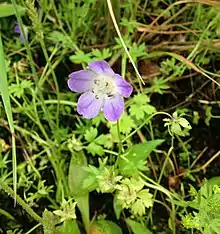Nemophila phacelioides
Nemophila phacelioides, commonly called large-flower baby-blue-eyes or Texas baby-blue-eyes,[1][2] is a flowering plant in the waterleaf family (Hydrophyllaceae). It is native to the South Central United States, where it is found in Arkansas, Oklahoma, and Texas.[3] Its natural habitat is in woodland openings in riparian bottoms, in sandy or silty soils.[4]
| Texas baby blue eyes | |
|---|---|
 | |
| Scientific classification | |
| Kingdom: | Plantae |
| Clade: | Tracheophytes |
| Clade: | Angiosperms |
| Clade: | Eudicots |
| Clade: | Asterids |
| Order: | Boraginales |
| Family: | Boraginaceae |
| Genus: | Nemophila |
| Species: | N. phacelioides |
| Binomial name | |
| Nemophila phacelioides | |
Description
Nemophila phacelioides is an herbaceous annual. It blooms in the spring, where it produces large showy flowers with a blue or purple outer edge, fading into white.[4] The flowers are about an inch wide, and have five petals. The leaves of the plant are irregular, with about 7-10 teeth. The plant grows about 10 inches tall, and can often form a blanket cover over the ground.[5]
Cultivation
This plant performs well in the shade, and needs slightly moist soil. Baby Blue Eyes do well sown from seed, with about 12 inches of spacing.[5] Seeds can be collected by tying a bag to the flower head.
References
- USDA, NRCS (n.d.). "Nemophila phacelioides". The PLANTS Database (plants.usda.gov). Greensboro, North Carolina: National Plant Data Team. Retrieved 29 November 2019.
- Nemophila phacelioides Lady Bird Johnson Wildflower Society
- "Nemophila phacelioides". County-level distribution map from the North American Plant Atlas (NAPA). Biota of North America Program (BONAP). 2014. Retrieved 29 November 2019.
- Diggs, George; Lipscomb, Barney; O'Kennon, Robert (1999). Flora of North Central Texas. Botanical Research Institute of Texas. p. 742.
- Nemophila Species, Largeflower Baby Blue Eyes Dave's Garden